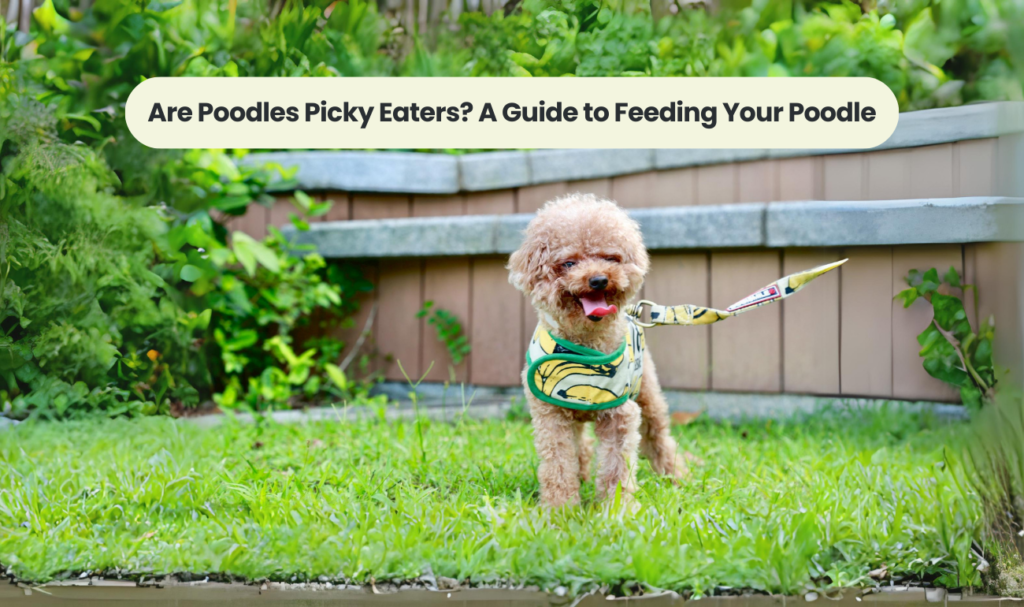Among dog breeds, poodles have long enjoyed widespread popularity due to their charming look and high levels of energy. You must be well-versed in the grooming requirements and any odor issues of any new animal pet before bringing them into your home. “Do Poodles smell?” is a question that comes up frequently. In this detailed tutorial, we will investigate what causes Poodle odor and what elements might be in play. All right, then, let’s take a sniff and find out what the real deal is with poodle smell.
Unmasking the Myth: Poodles and Doggy Odor
What about the poodle’s inherent aroma, though? People rave about the dog’s hypoallergenic and non-shedding coats. Many people mistakenly believe that Poodles have the infamous “doggy smell” that other dog breeds are known for. These elegant and perceptive dogs don’t have that typical dog smell. You must remember that Poodles, like other dogs, have their own distinct smell—one that is mild and usually not unpleasant. We should investigate what is causing this occurrence.
The Hypoallergenic Heritage of Poodles
As hypoallergenic dogs, poodles have a long and storied past. As a result, they shed less fur and create less of the saliva, urine, and dander that can cause allergic reactions in some people. There isn’t a strong smell often associated with Poodles because they don’t shed too much and produce less dander. Those who suffer from allergies or have a low tolerance for strong scents typically choose Poodles as their pet.
Grooming: The Key to a Fresh-Smelling Poodle
Proper grooming techniques are essential for preserving a Poodle’s cleanliness and preventing any odors, even though they may not have a distinct doggy smell. Maintaining a healthy and odor-free coat is essential for poodles because of their distinctive curly coat. If you want your Poodle to always smell nice, here are some basic maintenance tips:
Regular Brushing and Clipping
The curly coats of poodles can easily mat and provide a breeding ground for unpleasant odors and grime. By maintaining a regular schedule of brushing and cutting, you can keep your pet’s coat in good condition and reduce the likelihood of mat formation and bad odors.
Regular bathing is beneficial for poodles, but it’s important to strike a balance between the two. The coat’s natural oils can be stripped away in an overly thorough washing, which can cause dryness and even skin problems. To keep your Poodle clean and healthy, consult your vet or a professional groomer for advice on how often to bathe your pet and what kind of shampoo to use.
Also Read : Are poodles picky eaters
Ears and Eyes
Poodles need extra care since their unusual hair growth patterns put them at risk for eye and ear infections. In order to avoid any unpleasant smells that can be linked with the ears and eyes, it is vital to keep them clean and well-maintained. To reduce the likelihood of infection, it is important to have regular veterinary checkups and to groom your pet properly.
Oral Hygiene
Fresh Breath Is Vital: Just as it is for people, it is essential for dogs to maintain good dental hygiene. Preventing dental problems and keeping your Poodle’s breath fresh can be achieved with regular brushing using dog-friendly toothpaste and expert dental cleanings.
Anal Gland Expression
The Unseen World Anal glands are little sacs close to a dog’s anus that secrete a strong odor; they are responsible for odor control. An infection or obstruction in a poodle’s anal glands might cause the dog to smell bad. You can avoid unpleasant odors by taking your pet in for regular checkups and making sure their anal glands are expressed correctly.
Potential Causes of Poodle Odor
While Poodles don’t often have strong scents, a bad odor might develop in them due to certain underlying issues. In order to keep your Poodle healthy and odor-free, it is crucial to address these issues swiftly. First, we’ll have a look at what usually makes a Poodle smell bad:
Skin Infections: The Culprit Behind Unpleasant Odors
Odors in Poodles can be caused by skin illnesses like yeast, bacterium, or fungus. A lot of people get these infections because they use the wrong products for grooming, take too many baths, or are in the water for too long. The best way to diagnose and cure an infection is to take a pet to the vet as soon as you notice any of the following symptoms: smell, redness, itching, or hair loss.
Flatulence: When the Air Gets Unbearable
Even though it’s a normal body function, dogs’ flatulence may be quite smelly. Poodles, like dogs of other breeds, are susceptible to flatulence for a variety of reasons, including food allergies, eating too quickly, and poor nutrition. Consult your veterinarian to rule out underlying digestive difficulties or food sensitivities if your Poodle has flatulence that is extremely regular or significantly malodorous.
Improper Bathing Methods: Washing Away the Odor Woes
Poodles can develop undesirable odors if you wash them too vigorously or not well enough. Their curly fur makes it difficult, if not impossible, to rinse away dirt and oils just by running water over the coat. To remove any possible agents that could cause an unpleasant smell, it is essential to use shampoos specifically designed for dogs, to lather well, and to rinse well.
Anal Gland Issues: A Smelly Situation
When not working properly, the anal glands of Poodles and many other dog breeds can release a strong stench. Anal glands that are impacted or infected can cause pain and an unpleasant odor. To avoid these problems and maintain your Poodle’s pleasant aroma, have your veterinarian or skilled groomer express the anal glands on a regular basis.
Vaginal Odor in Female Poodles: A Cause for Concern
Because of the close proximity of the vagina and the anus, female Poodles may have vaginal odor, which is sometimes confused with anal odor. A urinary tract infection or other health problem could be indicated by a musty smell, which can occasionally smell like vinegar. Seek the advice of a veterinarian for an accurate diagnosis and treatment plan if you detect any peculiar symptoms or odors.
Maintaining a Fresh-Smelling Poodle: Tips and Tricks
Now that we’ve explored the factors that can contribute to Poodle odor let’s dive into some practical tips and tricks to ensure your furry companion remains fresh-smelling:
Visit the Vet: A Fresh Start
Regular veterinary check-ups are crucial for identifying and addressing any underlying health issues that may cause unpleasant odors in your Poodle. Your veterinarian can provide guidance on proper grooming practices, recommend suitable products, and address any concerns you may have regarding your Poodle’s odor.
Make the Bath Count: Quality Over Quantity
Bathing your Poodle is an essential part of their grooming routine. However, balancing cleanliness and maintaining the coat’s natural oils is vital. Follow a bathing schedule your veterinarian recommends and use high-quality shampoos and conditioners specifically formulated for Poodles.
Ensure Good Oral Health: A Breath of Fresh Air
Maintaining your Poodle’s oral hygiene is crucial for preventing bad breath and potential odor issues. Establish a regular toothbrushing routine using dog-friendly toothpaste, and consider professional dental cleanings if your Poodle is prone to dental problems.
Cleanliness After Pooping: No “Stool” Left Unturned
Regularly trim the hair around the rear end to prevent fecal matter from becoming trapped in your Poodle’s fur. Additionally, make it a habit to check for remnants after your Poodle has finished their business and clean the area promptly using canine wipes.
Feed a High-Quality Diet: From the Inside Out
A balanced and nutritious diet significantly affects your Poodle’s overall health and odor control. Opt for high-quality dog food formulated for Poodles, and consider consulting with your veterinarian to ensure your Poodle’s dietary needs are met.
FAQ’s
What is the least smelly dog?
The Basenji is often considered one of the least smelly dog breeds due to its unique grooming habits and lack of typical “doggy odor.”
How do I keep my Poodle from smelling?
To keep your Poodle from smelling, maintain a regular grooming routine including brushing to remove loose hair and debris, trimming the coat to prevent matting, cleaning the ears regularly, and bathing with a gentle dog shampoo as needed.
Why does my Poodle smell even after a bath?
Despite bathing, your Poodle may still smell due to various factors such as skin infections, ear infections, anal gland issues, or diet-related issues. Consulting with a veterinarian can help identify and address the underlying cause of the persistent odor.
How often do poodles need a bath?
Poodles typically need a bath every 4-6 weeks, although this can vary depending on factors such as coat type, activity level, and individual needs.
Conclusion
To wrap things up, Poodles don’t typically have a smell that many find unpleasant. In general, they don’t have a canine scent because of their hypoallergenic properties and the fact that their coats don’t shed. Remember that every dog has its own aroma, and that regular brushing and bathing are essential to keeping your Poodle smelling fresh. In order to keep your Poodle clean, healthy, and pleasant to be around—and to keep any unpleasant smells at bay—follow the steps indicated in this tutorial. So, enjoy the graceful allure of the Poodle breed without worrying about its odor if you take good care of it.

